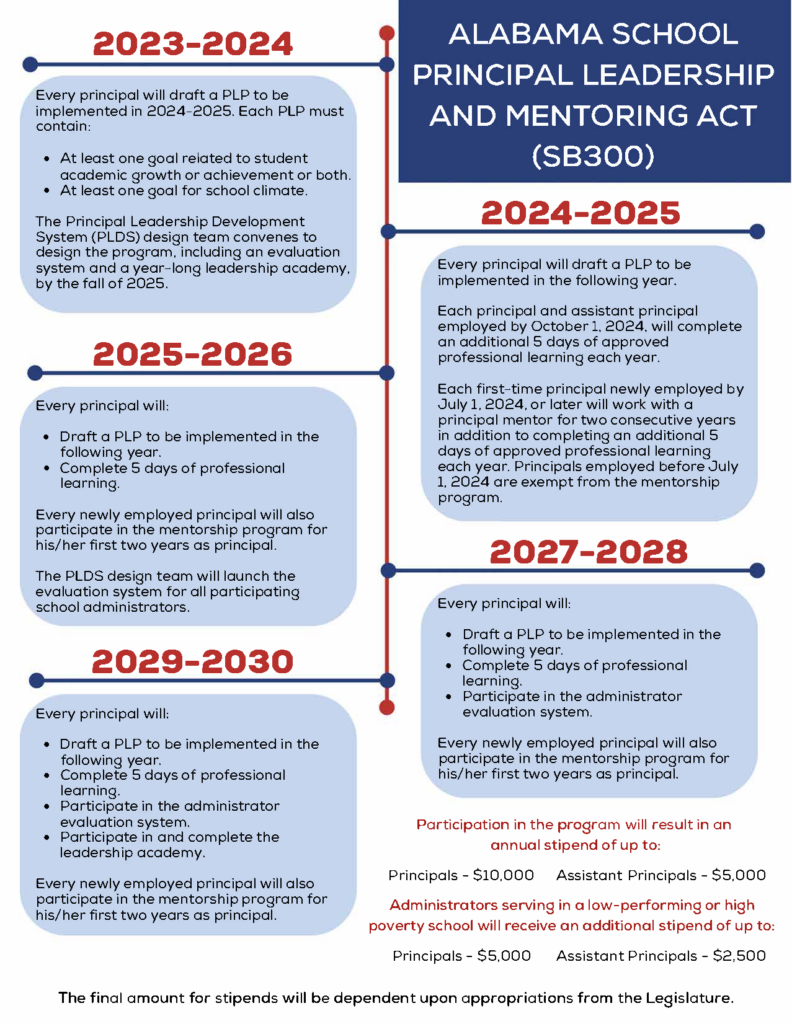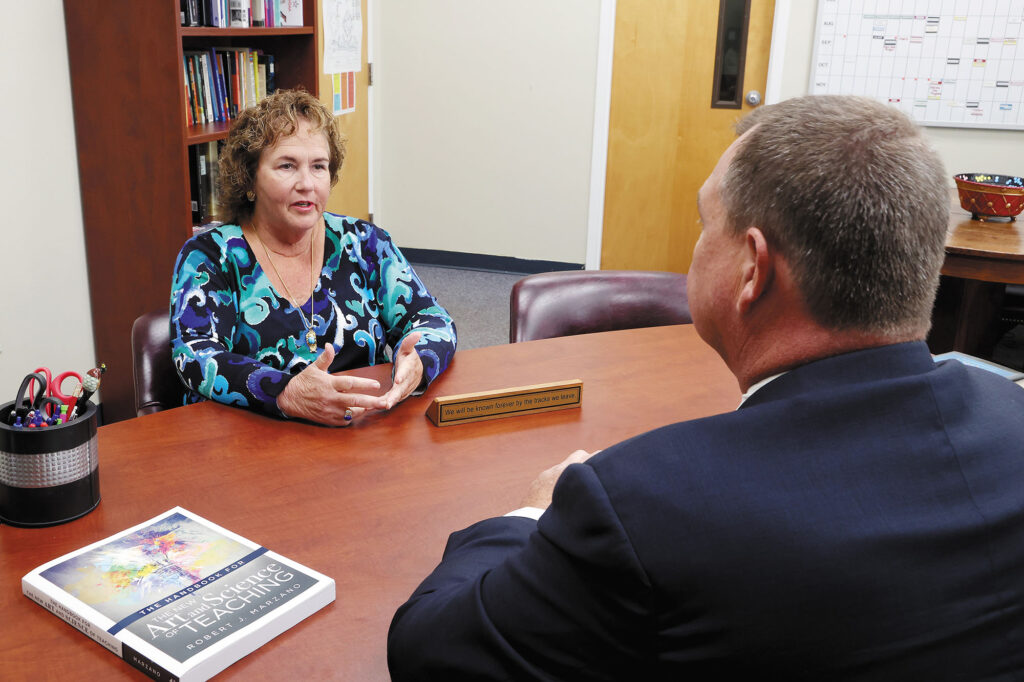Advocacy Agenda: January 2024

PHOTOS COURTESY OF COUNCIL FOR LEADERS IN ALABAMA SCHOOLS
May 23, 2023, marked the end of a whirlwind three weeks that changed school leadership in Alabama forever. With overwhelming support, the state legislature committed to the Alabama Principal Leadership Development System, comprised of six key components of school leadership in the 21st century:
- Formal, paid mentors for all novice principals
- A research-based Principal Leadership Framework
- Updated standards for school leaders
- A year-long Principal Leadership Academy
- An updated Principal Evaluation System aligned to the framework and standards
- A statewide professional learning infrastructure
Legislators have backed this sweeping overhaul with the promise of annual stipends of up to $10,000 for school principals and up to $5,000 for assistant principals who participate in the program. They have even pledged an additional stipend for school leaders who staff a low-performing or high-poverty school—up to $5,000 for school principals and up to $2,500 for assistant principals.
While the School Principal Leadership and Mentoring Act moved quickly through the legislative process in 2023, that speed was the result of a year of planning and advocacy from the Council of Leaders in Alabama Schools (CLAS), for which I am the executive director.
The genesis for the School Principal Leadership and Mentoring Act was born in the 2022 legislative session. Sen. Arthur Orr (R-Decatur), chair of the Senate Finance and Taxation-Education committee, introduced the Alabama Numeracy Act to revamp elementary math instruction similar to the literacy instruction updates via the Alabama Literacy Act in 2019. The original draft of the Numeracy Act (SB171, pp. 13–15) required the development of an instructional leadership framework for elementary school leaders to support student numeracy. That framework was pulled from SB171 based on feedback from CLAS and other stakeholders, who suggested the bill would have more impact if it were streamlined to focus on elementary math.
However, Sen. Orr was still intrigued by the idea of a framework for instructional leaders and saw that as an avenue to provide increased compensation to school leaders willing to participate. Updates to teacher pay in the 2021 and 2022 sessions meant that school leaders in many schools were making less than the teachers they supervised. CLAS suggested to Sen. Orr that we use this as an opportunity to build a comprehensive leadership system that would enhance school leadership at both the elementary and secondary school levels.
CLAS started by reaching out to peers in other states, such as Clark Mershon of the Missouri Association of Secondary School Principals, Jason Leahy of the Illinois Principals Association, and Karen Bingert of the New Jersey Principals and Supervisors Association, and many others, who had experience with similar initiatives. With those connections fostered through collaboration with NASSP and NAESP (National Association of Elementary School Principals), we received valuable insight and feedback on what would—and would not—work for Alabama school leaders.
The Principal Mentor Program must launch in July 2024, when all newly hired, first-year principals will be required to participate in the program’s first cohort. Each new principal will be paired with a paid, formal mentor to guide them through their first year.
The Missouri Leadership Development System stood out for its comprehensive, research-based components. I was especially intrigued by their use of mentors. CLAS already has a small-scale cohort-based mentoring program administered through our New Principals Institute. However, we can only reach a small portion of principals in a given school year and a much larger-scale program is essential to reshape school leadership statewide.
Next, CLAS reached out to experts in Alabama with years of experience in school leadership and mentoring programs—Brenda Mendiola and Yvette Bynum at the University of Alabama and Ellen Hahn Reames at Auburn University. They brought in Linda Searby, co-editor of The Art and Science of Mentoring, as we engaged in rich discussions to sketch out what a statewide mentoring program could look like.
Based on the experts’ input, CLAS crafted an initial draft of the bill before bringing in other stakeholders, including Mark Dixon and Corinn O’Brien of the A+ Education Partnership. As major partners in the Literacy and Numeracy Acts, A+ was especially focused on a leadership framework and corresponding standards that emphasize the role of the principal as the instructional leader, informed by research from the Wallace Foundation.
CLAS and A+ collaborated on a revised draft that incorporated elements each group considered non-negotiable, such as mentoring for novice principals and a comprehensive leadership framework with corresponding standards. Developing a new framework as well as leadership standards would necessitate a new evaluation system aligned to both and would also require a method of delivery that would reach all school leaders in Alabama. The bill braided all these components into a Principal Leadership Development System that would use an academy model inspired by Missouri’s Leadership Development System to deliver key professional learning and support to school leaders.
Once the School Principal Leadership and Mentoring Act gained momentum in the senate, CLAS reached out to Rep. Alan Baker (R-Brewton), a former educator who continues to champion public education. Rep. Baker agreed to sponsor the bill when it arrived in the House, giving it a better chance of success in that chamber. Rep. Terri Collins (R-Decatur), chair of the House Education Policy committee, also supported the bill as its goal of enhancing instructional leadership in schools supported the Alabama Literacy Act, her signature legislation.
When the bill passed the House of Representatives just 14 days after introduction, I was floored. This bill is a major commitment from the Alabama Legislature to raise the bar for schools across Alabama, giving us more leverage to ensure every student receives the best education possible. The implementation of the Literacy and Numeracy Acts has significantly increased the pressure on our elementary schools. However, through the School Principal Leadership and Mentoring Act we see an investment in providing the necessary assistance to Alabama’s school leaders, enabling them to better support their teachers and students.
We are in the beginning phase of the buildout of the Alabama Principal Leadership Development System. The first step was to bring together the 21-member Principal Design Team (PDT) required in the law. Seven entities were empowered to make appointments to the team; CLAS was responsible for designating three principals and three assistant principals. Alabama law requires any statewide effort like this to reflect the state’s diversity, including gender, race, geography, and school grade level.
The PDT held its first meeting in August 2023 to introduce all members and selected Jimmy Shaw, superintendent of Florence City Schools and a pioneer in school leadership development, as chair. So far, the PDT has met at least once a month to work on its monumental task of shaping the Alabama Principal Leadership Development System.
One of the PDT’s first decisions was to designate CLAS as the entity responsible for developing the Principal Mentor Program, which is part of Alabama Principal Leadership Development System. Our association already has a communication infrastructure in place with access to all school leaders in the state, and we have a cadre of school leadership experts at the ready. The Principal Mentor Program must launch in July 2024, when all newly hired, first-year principals will be required to participate in the program’s first cohort. Each new principal will be paired with a paid, formal mentor to guide them through their first year.

All principals, including those newly hired, must complete five additional days of professional learning as part of their annual Professional Learning Plan (PLP). The School Principal Leadership and Mentoring Act requires that, starting with the 2023–24 school year, each school leader will plan their PLP in the current year to be implemented in the following year and incorporate those five additional days of professional learning in their PLP. The law also requires each PLP to include at least one goal on student growth, or student achievement, or both AND at least one goal on school climate.
New requirements are added each year (see graphic, left), so that eventually all principals and assistant principals will:
- Complete the Principal Mentor Program.
- Participate in a year-long Principal Leadership Academy.
- Plan and implement an annual PLP with at least two required goals and five additional days of professional learning.
- Participate in the revised Principal Evaluation System aligned with the Principal Leadership Framework and Standards.
I am confident that when fully implemented, the School Principal Leadership and Mentoring Act will have a significant, positive impact on student achievement in Alabama, and I am grateful to the Alabama Legislature for committing to this investment in Alabama’s school leaders.
Vic Wilson, EdD, is the executive director of the Council for Leaders in Alabama Schools and the Alabama Association of Secondary School Principals.
Why New School Leaders Need Mentoring
Ross Reed | Principal
As school leaders, we wear various hats, from being an instructional leader to being a disciplinarian; from conducting safety drills to attending PTO meetings; from being a substitute bus driver to serving lunch in the cafeteria. We attend more sporting events than one can count. When the telephone rings at 2 a.m., we meet the fire department to find out why an alarm was mysteriously activated. We meet with parents to discuss why their student should have a different teacher because “it’s not the right fit,” and we try to explain why their child didn’t make a particular team or squad. We counsel students through conflicts, and we recognize them for their achievements. And somewhere in there, we try to ensure that math, science, history, and English are taught.

PHOTOS COURTESY OF COUNCIL FOR LEADERS IN ALABAMA SCHOOLS
As Vic Wilson’s article on page 16 makes clear, the Council for Leaders in Alabama Schools, worked closely with members of the Alabama Legislature to develop the School Principal Leadership and Mentoring Act, which created the state’s Principal Leadership Development System and includes the Principal Mentor Program. Sure, administrators have earned extra degrees to serve in an educational leadership position; however, there is no one-size-fits-all way to prepare an administrator for their school’s front office. Candidates from the same leadership class could be hired as an assistant principal of a junior high school with 1,500 students in a suburban community or a principal of an elementary school with 350 students in a rural county. In these very different settings, each new principal needs targeted support to navigate their situation beyond what their leadership program can provide.
Each new principal needs targeted support to navigate their situation beyond what their leadership program can provide.
As a building administrator, I believe mentoring is crucial for the success of novice administrators. There are so many aspects of being an administrator that can be overwhelming, so having a go-to person on your side helps ease some of the stress and strain. A mentor should be someone who has firsthand experience with the challenges of the principalship but is not involved in that principal’s evaluation. Alabama’s Principal Mentor Program will pair each new principal with a trained mentor to provide ongoing support and professional development. The mentor will provide guidance and advice and serve as a sounding board for ideas.

For a novice administrator fresh out of the classroom, there is a significant transition from knowing a smaller group of children to working with an entire student body. A mentor can walk a novice principal through establishing a relationship for student success. A mentor can also help the novice administrator leverage their administrative team to help identify and meet students’ needs.
We live in a world where it is easy to send an email as the first line of communication, because sometimes phone calls can be stressful or unpleasant. As a mentor, I remind my assistant principals that calling and talking to a parent should be our default communication method, so we make a meaningful connection. I ask our novice administrators to remember that we didn’t create the issue at hand, but it is how we, the adults, try to work together for the betterment of a family’s child that will make the most difference for that child.
Lastly, a novice administrator must have success with the faculty and staff. When new administrators are thrust into a leadership role, whether they are new to the school or promoted from within, they have only one opportunity to make a good first impression. Here is where a mentor’s role is so vital. A mentor will prepare them for making a great first impression and will help them overcome any early mistakes they make in the role. I am a veteran educator; this is my 30th year in education and my 10th year as a principal. If there is one thing I can bank on it is that time marches on. Finding teachers and administrators is becoming more and more difficult. The Principal Leadership Development System will help better prepare administrators for the realities of their new roles and prepare them to take on the challenges they face at school. I appreciate the Alabama Legislature and Gov. Kay Ivey for passing the School Leadership and Mentoring Act. It’s a step in the right direction for Alabama schools.
Ross Reed is the principal of Auburn Junior High School in Auburn, AL, and a board member of the Council for Leaders in Alabama Schools.
